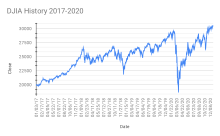
Back Beursineenstorting Afrikaans انهيار السوق المالي Arabic Fallida borsària Catalan Krach na burze Czech Børskrak Danish Börsenkrach German Χρηματιστηριακό κραχ Greek Quiebra financiera Spanish سقوط بازار سهام Persian Pörssiromahdus Finnish

A stock market crash is a sudden dramatic decline of stock prices across a major cross-section of a stock market, resulting in a significant loss of paper wealth. Crashes are driven by panic selling and underlying economic factors. They often follow speculation and economic bubbles.
A stock market crash is a social phenomenon where external economic events combine with crowd psychology in a positive feedback loop where selling by some market participants drives more market participants to sell. Generally speaking, crashes usually occur under the following conditions: a prolonged period of rising stock prices (a bull market) and excessive economic optimism, a market where price–earnings ratios exceed long-term averages, and extensive use of margin debt and leverage by market participants. Other aspects such as wars, large corporate hacks, changes in federal laws and regulations, and natural disasters within economically productive areas may also influence a significant decline in the stock market value of a wide range of stocks. Stock prices for corporations competing against the affected corporations may rise despite the crash.[1]
There is no numerically specific definition of a stock market crash but the term commonly applies to declines of over 10% in a stock market index over a period of several days. Crashes are often distinguished from bear markets (periods of declining stock market prices that are measured in months or years) as crashes include panic selling and abrupt, dramatic price declines. Crashes are often associated with bear markets; however, they do not necessarily occur simultaneously. Black Monday (1987), for example, did not lead to a bear market. Likewise, the bursting of the Japanese asset price bubble occurred over several years without any notable crashes. Stock market crashes are not common.
Crashes are generally unexpected. As Niall Ferguson stated, "Before the crash, our world seems almost stationary, deceptively so, balanced, at a set point. So that when the crash finally hits – as inevitably it will – everyone seems surprised. And our brains keep telling us it’s not time for a crash."[2]
- ^ Galbraith, J. The Great Crash 1929, 1988 ed., Houghton Mifflin Co. Boston, pp. xii–xvii
- ^ Farrell, Paul B. (February 19, 2014). "Crash of 2014: Like 1929, you'll never hear it coming". Marketwatch.